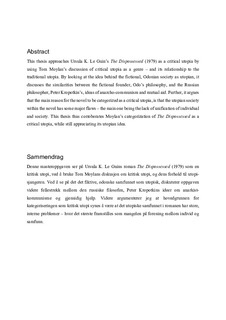«Unbuilding Walls» - En nærlesing av Ursula K. Le Guins The Dispossessed
Master thesis

Permanent lenke
http://hdl.handle.net/11250/2573268Utgivelsesdato
2018Metadata
Vis full innførselSamlinger
Sammendrag
This thesis approaches Ursula K. Le Guin’s The Dispossessed (1979) as a critical utopia by using Tom Moylan’s discussion of critical utopia as a genre – and its relationship to the traditional utopia. By looking at the idea behind the fictional, Odonian society as utopian, it discusses the similarities between the fictional founder, Odo’s philosophy, and the Russian philosopher, Peter Kropotkin’s, ideas of anarcho-communism and mutual aid. Further, it argues that the main reason for the novel to be categorized as a critical utopia, is that the utopian society within the novel has some major flaws – the main one being the lack of unification of individual and society. This thesis thus corroborates Moylan’s categorization of The Dispossessed as a critical utopia, while still appreciating its utopian idea. -
Denne masteroppgaven ser på Ursula K. Le Guins roman The Dispossessed (1979) som en kritisk utopi, ved å bruke Tom Moylans diskusjon om kritisk utopi, og dens forhold til utopisjangeren. Ved å se på det det fiktive, odonske samfunnet som utopisk, diskuterer oppgaven videre fellestrekk mellom den russiske filosofen, Peter Kropotkins ideer om anarkistkommunisme og gjensidig hjelp. Videre argumenterer jeg at hovedgrunnen for kategoriseringen som kritisk utopi synes å være at det utopiske samfunnet i romanen har store, interne problemer – hvor det største framstilles som mangelen på forening mellom individ og samfunn.